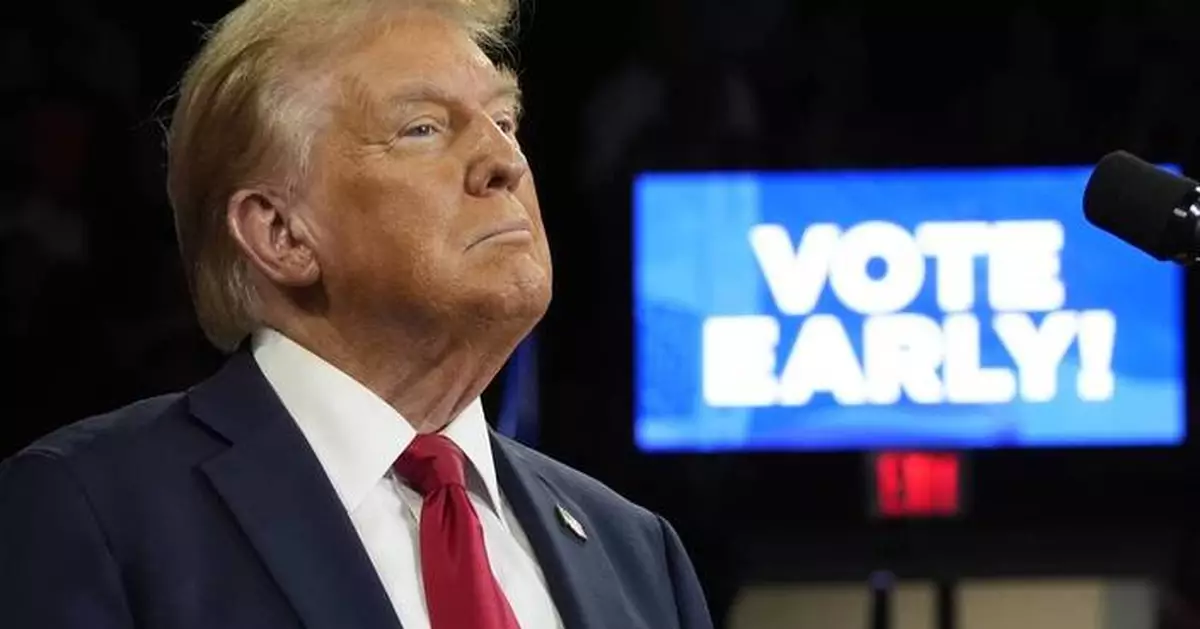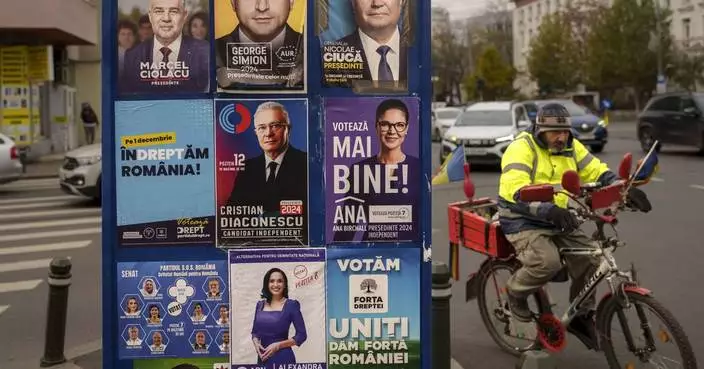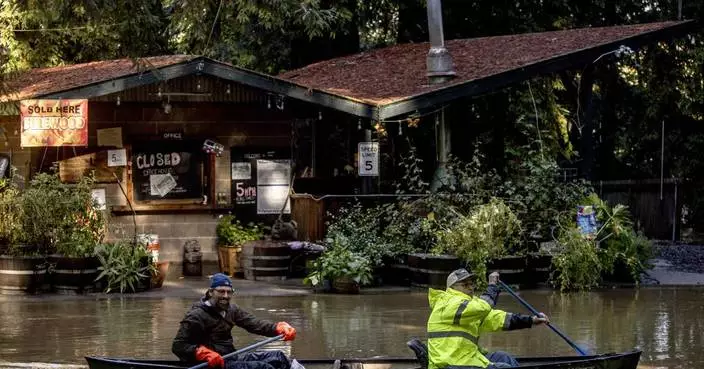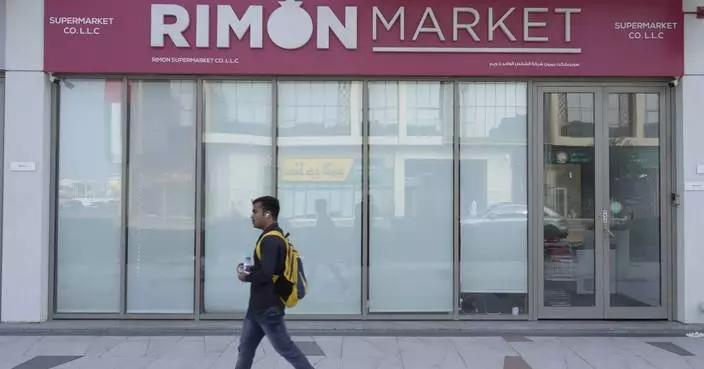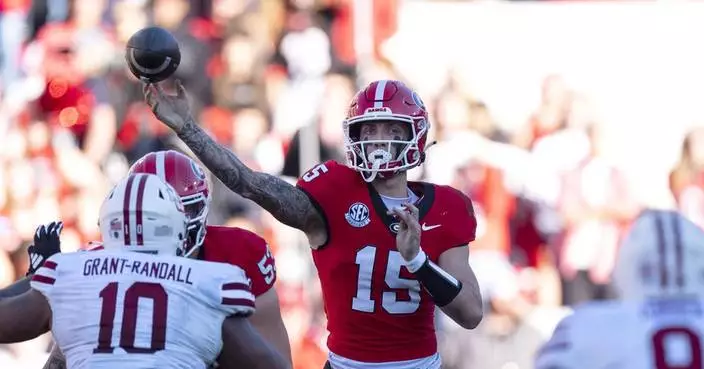WASHINGTON (AP) — Republican Donald Trump, who still refuses to accept that he lost the 2020 election to Democrat Joe Biden, says he wants a presidential victory Nov. 5 to be so overwhelming that the results are “too big to rig.”
“We want a landslide," he recently told supporters in Georgia. “We can’t let anything happen.”
No matter the margins, Republicans and Democrats are preparing for a potentially lengthy battle over the results once they come in. Dozens of lawsuits that could set the stage for challenges after the votes are counted are already playing out in courts across the country. Most have been filed by Republicans and their allies. Many of the cases involve challenges to mail-in balloting, ballots from overseas voters and claims of voting by people who are not U.S citizens.
Trump, who faces federal criminal charges over his efforts to overturn his 2020 defeat, has repeatedly declined to state unequivocally that he will accept this year's results.
Democrats, meanwhile, warn that election deniers installed in key voting-related positions nationwide may refuse to certify legitimate results and prompt litigation.
“In 2020, the election deniers were improvisational. ... Now that same election denialist impulse is far more organized, far more strategic and far better funded," Michael Waldman, president of the Brennan Center for Justice, told reporters during a telephone briefing. “At the same time, the election system is far better able, we believe, to handle something like this."
While partisan battles over voting rules have long been part of presidential campaigns, election litigation has soared in recent years. With money pouring in for legal fights and the number of outside groups involved in election litigation proliferating, the disputes are not likely slow down anytime soon.
“It’s not even just the parties — it’s outside organizations, and they're fundraising on how they’re able to protect democracy, how they’re able to preserve the integrity of the election, whatever it might be," said Derek Muller, an election law expert and professor at the University of Notre Dame Law School. "They have wealthy donors who are backing this litigation. So there doesn’t seem to be any de-escalation in sight.”
With a little over two weeks before Election Day, about 180 voting and election cases have been filed so far this year, according to Democratic lawyer Marc Elias, who founded the election litigation tracking group Democracy Docket.
It comes four years after Trump and his allies flooded the courts with lawsuits claiming fraud. Those filings were roundly rejected by judges nominated to the bench by presidents of both major political parties.
The rate of election litigation has nearly tripled since 2000, when the Supreme Court in a 5-4 vote effectively settled the election in favor of Republican George W. Bush over Democrat Al Gore, election law expert Rick Hasen, now at the University of California, Los Angeles, School of Law, wrote in 2022.
The high court's role in that race supercharged interest in election law, fueling a rise in litigation that accelerated in 2020 because of changes to voting rules during the coronavirus pandemic.
Changes to campaign finance rules a decade ago have allowed donors to give parties huge sums of cash specifically for legal fights. Election litigation these days is not always about winning in court, but also sending a political message to galvanize donors.
“It’s become part of the campaign to sort of show your stuff in court,” said Rebecca Green, a professor at William & Mary Law School and an election law expert. “It’s become common that campaigns will litigate as a matter of sort of headline drawing, getting a message out."
Trump’s lies about losing the 2020 election have been adopted by many in his own party.
But in 2020, while he started off with a deep bench of sophisticated lawyers, most left the effort as Trump continued to make unfounded claims of voter fraud, even as his own administration insisted the election had been secure and there was no widespread fraud.
The Republican National Committee this spring launched what it described as an “unprecedented” election integrity program, with plans to have 100,000 volunteers and lawyers in key battleground states as part of a "commitment to ensuring transparency and fairness in the 2024 elections.”
“President Trump’s election integrity effort is dedicated to protecting every legal vote, mitigating threats to the voting process, and securing the election. While Democrats continue their election interference against President Trump and the American people, our operation is confronting their schemes and preparing for November," said Claire Zunk, RNC elections integrity communications director. She said they were prepared to litigate.
Some of the cases currently in the courts appear unlikely to be resolved before Nov. 5, but the claims could come back after the votes are tallied to challenge the results in court, said Jess Marsden, counsel at the group Protect Democracy and director of its program to ensure free and fair elections.
The most important courtroom fights could be over rules for certifying the vote. There’s a new, faster review process for certification disputes under updates to the Electoral Count Reform Act passed by Congress in 2022. Similar to redistricting cases, certification disputes can go before a three-judge court in the state where they originated and be quickly appealed to the Supreme Court.
“I do suspect that might be utilized by losing candidates as a Hail Mary attempt, or in some cases, worse, a way to try to enlist the court in trying to change the outcome of the election,” said Wendy Weiser, vice president for democracy at the Brennan Center. “That said, it’s also a safeguard in case there’s been some shenanigans relating to certification."
In Georgia last week, a judge declared that seven new election rules recently passed by the State Election Board are “illegal, unconstitutional and void.” That includes one that required the number of ballots to be hand-counted after the polls close. Another required county officials to conduct a “reasonable inquiry” before certifying results, but it did not specify what that means.
Republicans have appealed the judge’s decision invalidating the rules to the state’s highest court.
RNC Chair Michael Whatley called that ruling “the very worst of judicial activism.”
“By overturning the Georgia State Election Board’s common-sense rules passed to safeguard Georgia’s elections, the judge sided with the Democrats in their attacks on transparency, accountability and the integrity of our elections,” Whatley said in a statement. “We will not let this stand.”
There's no legitimate way for a county or state to refuse to certify election results, but that doesn't mean they won't try, Weiser told reporters Wednesday. Even if they're unsuccessful, those efforts can fuel conspiracy theories and “contribute to chaos and delays," she said.
“If there are multiple efforts to refuse to certify simultaneously and a huge flurry of lawsuits simultaneously when the margin is very close, that will make it more challenging for election officials,” Weiser said.
Associated Press writers Kate Brumback in Atlanta and Christine Fernando in Chicago contributed to this report.
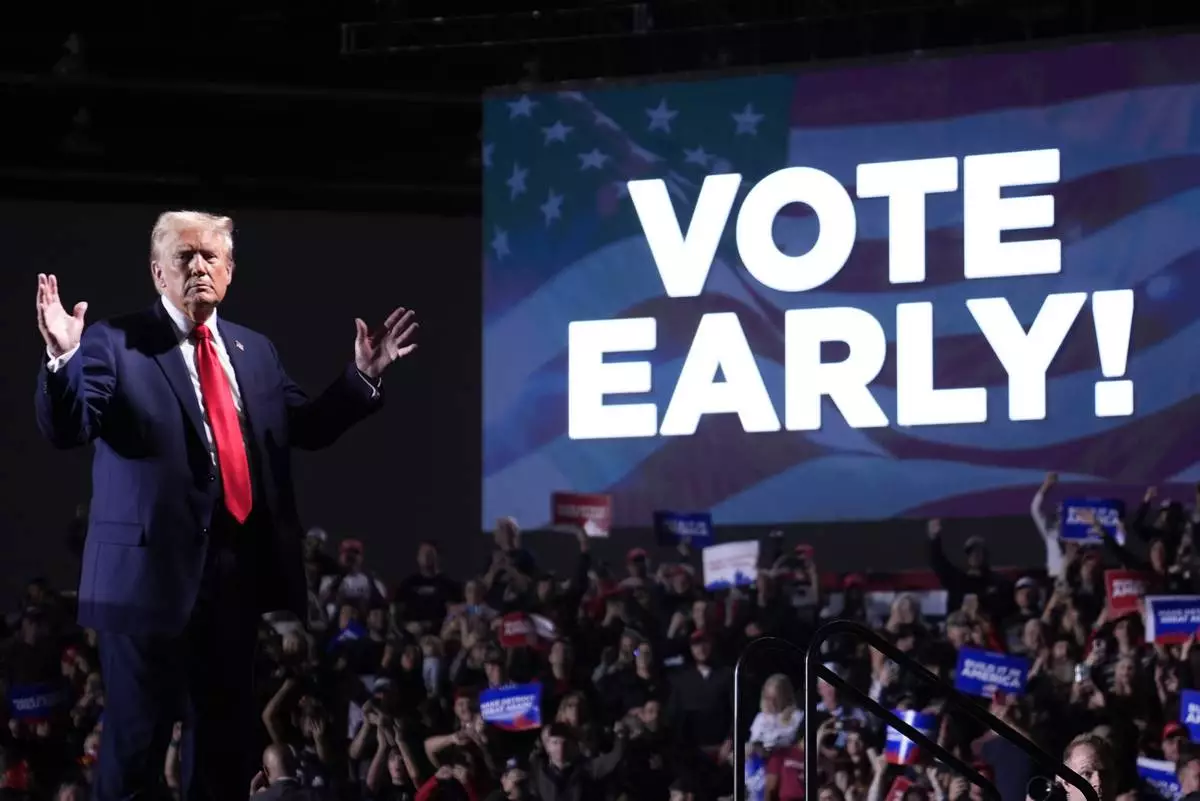
Republican presidential nominee former President Donald Trump gestures after speaking at a campaign rally, Friday, Oct. 18, 2024, in Detroit. (AP Photo/Evan Vucci)
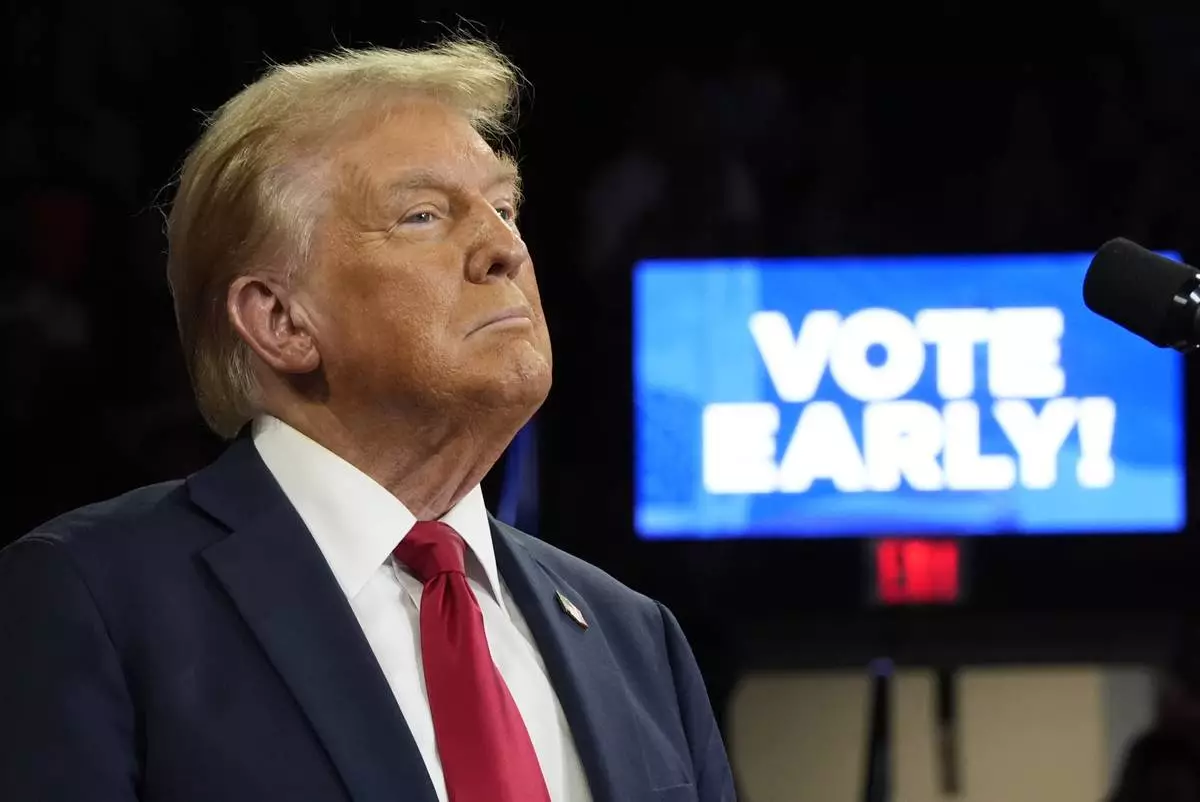
With "Vote Early" displayed on a screen behind, Republican presidential nominee former President Donald Trump speaks at a campaign rally at the Santander Arena, Wednesday, Oct. 9, 2024, in Reading, Pa. (AP Photo/Alex Brandon)
LAS VEGAS (AP) — Max Verstappen cruised to a fourth consecutive Formula 1 championship on Saturday night by finishing fifth in the Las Vegas Grand Prix.
Verstappen needed only to finish ahead of Lando Norris of McLaren to give Red Bull a fourth straight driver championship. The Dutchman started fifth but was already up to second by the 10th lap around the street circuit that includes the famed Las Vegas Strip.
Norris, who had to score at least three points more than Verstappen to extend the championship fight, finished sixth. Verstappen needed only to finish higher than Norris to win the title, which he did with two races remaining on the season.
He ended the race up 63 points over Norris with two events remaining this season.
“Max Verstappen you are a four-time world champion," team principal Christian Horner said on the radio. "That is a phenomenal, phenomenal achievement. You can be incredibly proud of yourself as we are."
Verstappen, only the sixth driver in F1 history to win at least four titles, sounded unusually emotional on the radio.
“Oh My God, what a season. Four times. Thank you, thank you guys,” he said. “We gave it all.”
The race was won, meanwhile, by George Russell who was followed by Lewis Hamilton in the first 1-2 sweep for the Mercedes drivers since 2022. Hamilton came from 10th on the grid — two weeks after a demoralizing race in Brazil — to capture his podium finish.
The duo crossed the finish line under a checkered flag waved by actor Sylvester Stallone.
Carlos Sainz Jr. finished third for Ferrari as the constructor championship remains a tight battle between leader McLaren and Ferrari. Charles Leclerc, his teammate, was fourth. Red Bull had won the title that pays roughly $150 million in prize money the last two seasons but has slipped to third in the standings.
But that championship battle appears headed to next month's season finale in Abu Dhabi. McLaren has a 24-point lead over Ferrari headed into this weekend's race in Qatar after Norris and Oscar Piastri finished sixth and seventh in Las Vegas.
“Max deserved to win it. He drove a better season than I did, he deserved it more than anyone else,” Norris said. “Max just doesn't have a weakness. When he's got the best car, he dominates and when he's not got the best car, he's still just there always.”
Verstappen, meanwhile, made easy work of Norris after a season where the McLaren driver pushed him harder than he'd been challenged since Verstappen's first title in 2021.
“To stand here as a four-time world champion is something I never thought would be possible,” Verstappen told actor Terry Crews, who moderated the podium news conference held in front of the Bellagio's famed fountains.
“It was a very challenging season and I had to be calm. I think this season taught me a lot of lessons and we handled it well as a team, so that of course makes it a very special and beautiful season.”
Verstappen, who is 27, won 19 races last year. He opened this season on a tear but a long winless streak from June until Brazil two weeks ago has him with only eight wins, his fewest since 2020.
Verstappen asked at the Bellagio what time it was, noting he was in Las Vegas and “I'm very thirsty.” He had a champagne celebration awaiting him.
Race-winner Russell, meanwhile, said he’d be skipping his scheduled flight home to celebrate the victory with actor Crews. He also twice had to sit down on the podium to wipe champagne out of his eyes.
Verstappen was cruising in third with about 20 laps remaining and not overly pushing when Red Bull urged Verstappen to be patient over the team radio.
“Max, just don't lose sight of our aim today, yeah?” he was told.
Verstappen wasn't interested in receiving any instructions.
“Yeah, yeah. I'm doing my race,” he replied.
When he later saw the Ferrari drivers behind him, he asked for instructions because of the constructor championship implications.
"Do you want me to try to keep them behind or what?" Verstappen asked of Sainz and Leclerc.
"I think you should, yeah," Red Bull told Verstappen.
He couldn't hold them off but it made no difference as his season was dominant enough to match former Red Bull driver Sebastian Vettel as four-time champions for the organization.
This was the second year of the race after last year's debut was a bit of a disaster in that locals were livid for months over ongoing construction, as well as traffic detours and delays, the inability to access many local businesses, outrageous price gouging by the tourism industry as well as LVGP ticketing, and then a loose valve cover that nearly destroyed Sainz's Ferrari minutes into the first practice.
It caused an hours-long delay for repairs, fans were kicked out of the circuit, and F1 ran practice until 4 a.m. — when it legally had to reopen the streets to the public.
This year has been far less hectic, in part because all of the infrastructure headaches were a year ago, but also that last year's race was spectacular. Despite all its speed bumps, the actual running of the race was one of the best of the F1 season.
Russell started on the pole ahead of Sainz, who wanted redemption after the valve-cover fiasco last year. He had to serve a penalty because his car was damaged in the incident.
“I was hoping Vegas had something to offer me after last year, but I will take a podium," Sainz said. "I was looking at every manhole, avoiding them this time.”
The race is the final stop in the United States for F1, which has exploded in American popularity the last five years. The trio of races in Miami; Austin, Texas; and Las Vegas are more than any other country.
After the race completion, F1 next week is expected to announce it will expand the grid to 11 teams to make room for an American team backed by General Motors' Cadillac brand. The team was initially started by Michael Andretti, who could not receive approval from F1 on his expansion application.
Andretti has since turned over his ownership stake to Indiana-businessman Dan Towriss and Mark Walter, the controlling owner of the Los Angeles Dodgers. They would run the Cadillac F1 team that would likely join the grid in 2026.
The announcement of the American team did not come during the weekend to not derail from the Las Vegas Grand Prix, which is the showpiece of the Liberty Media portfolio.
The race drew 306,000 fans over three days.
AP auto racing: https://apnews.com/hub/auto-racing

Red Bull driver Max Verstappen, of the Netherlands, runs a warm up lap during the F1 Las Vegas Grand Prix auto race, Saturday, Nov. 23, 2024, in Las Vegas. (AP Photo/Rick Scuteri)

Red Bull driver Max Verstappen, of the Netherlands, conducts an interview after the F1 Las Vegas Grand Prix auto race, Sunday, Nov. 24, 2024, in Las Vegas. (AP Photo/Matt York)

Mercedes driver George Russell, of Britain, celebrates on the podium after winning the F1 Las Vegas Grand Prix auto race, Sunday, Nov. 24, 2024, in Las Vegas. (AP Photo/Matt York)

Mercedes driver George Russell, of Britain, celebrates on the podium after winning during the F1 Las Vegas Grand Prix auto race, Saturday, Nov. 23, 2024, in Las Vegas. (AP Photo/John Locher)
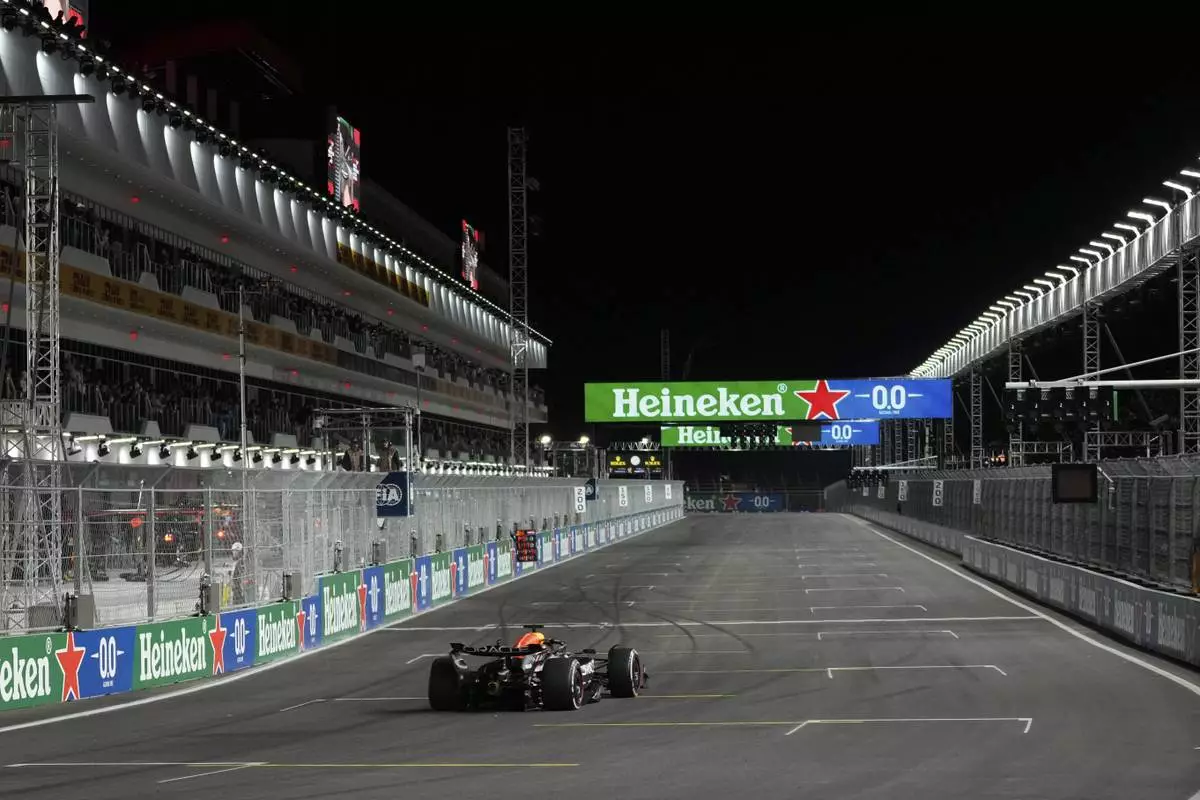
Red Bull driver Max Verstappen, of the Netherlands, races during the F1 Las Vegas Grand Prix auto race, Saturday, Nov. 23, 2024, in Las Vegas. (AP Photo/Matt York)

Red Bull driver Max Verstappen, of the Netherlands, races during the F1 Las Vegas Grand Prix auto race, Saturday, Nov. 23, 2024, in Las Vegas. (AP Photo/Matt York)

Red Bull driver Max Verstappen, of the Netherlands, competes during the F1 Las Vegas Grand Prix auto race, Sunday, Nov. 24, 2024, in Las Vegas. (AP Photo/Matt York)
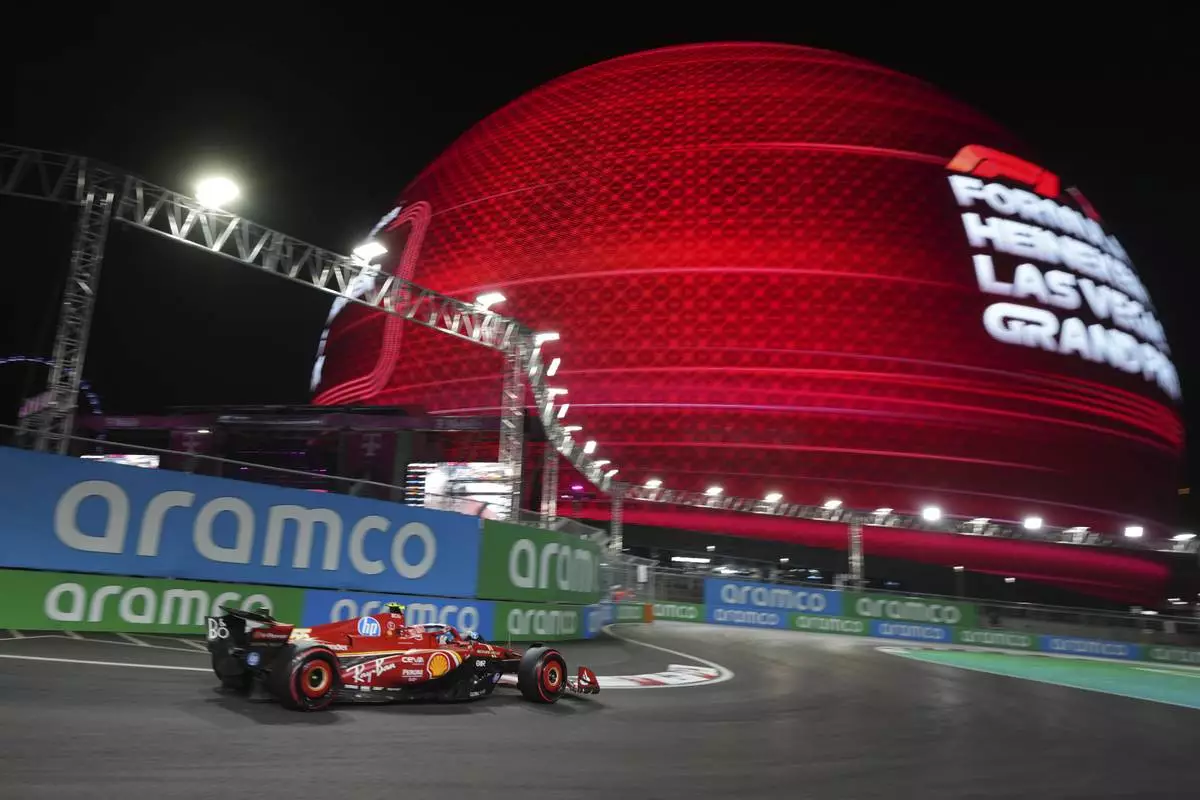
Ferrari driver Carlos Sainz, of Spain, drives during qualifications for the Formula One U.S. Grand Prix auto race, Friday, Nov. 22, 2024, in Las Vegas. (AP Photo/Rick Scuteri)

McLaren driver Lando Norris, of Britain, talks with his crew after the final practice session for the Formula One U.S. Grand Prix auto race, Friday, Nov. 22, 2024, in Las Vegas. (AP Photo/John Locher)

Red Bull driver Max Verstappen, of the Netherlands, waits in the garage before the final practice session for the Formula One U.S. Grand Prix auto race, Friday, Nov. 22, 2024, in Las Vegas. (AP Photo/John Locher)

Mercedes driver George Russell, of Britain, drives during qualifications for the Formula One U.S. Grand Prix auto race, Friday, Nov. 22, 2024, in Las Vegas. (AP Photo/Rick Scuteri)

Red Bull driver Max Verstappen, of the Netherlands, drives the course during qualifying for the Formula One U.S. Grand Prix auto race, Friday, Nov. 22, 2024, in Las Vegas. (AP Photo/Rick Scuteri)
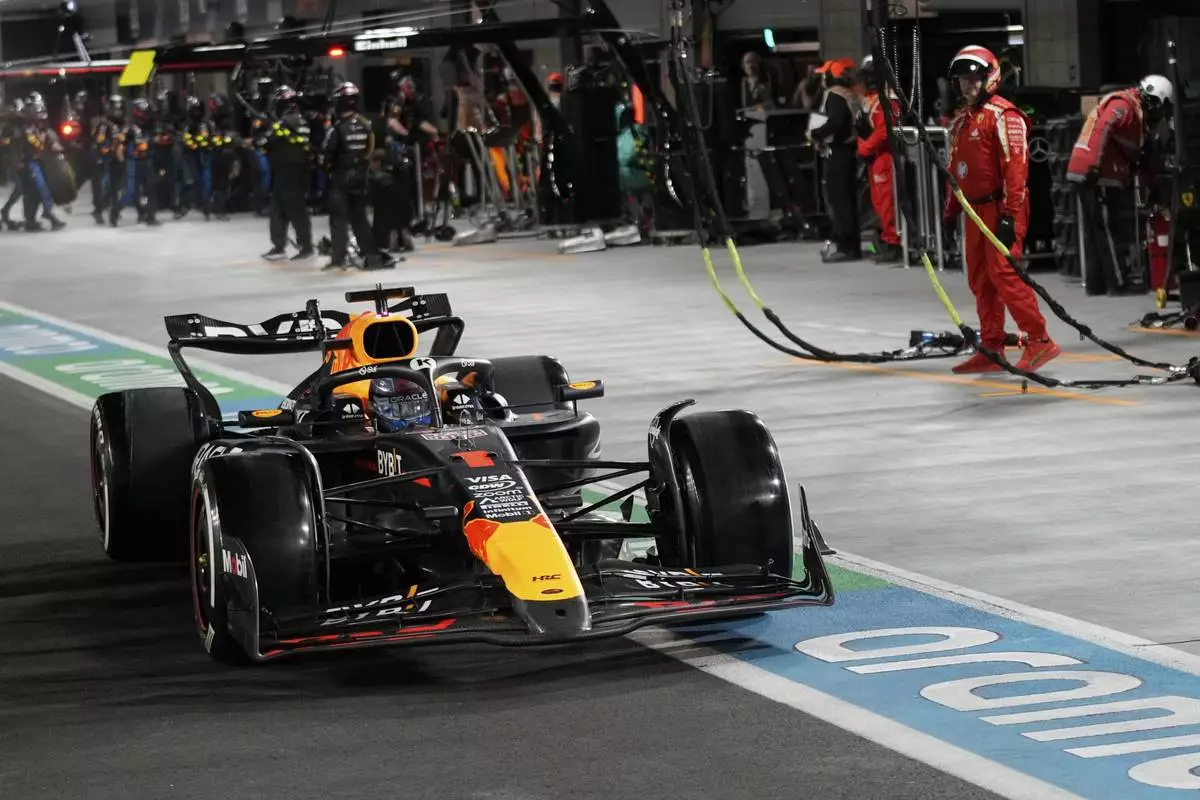
Red Bull driver Max Verstappen, of the Netherlands, drives on pit row during the F1 Las Vegas Grand Prix auto race, Saturday, Nov. 23, 2024, in Las Vegas. (AP Photo/John Locher, Pool)

Red Bull driver Max Verstappen, of the Netherlands, waves before the F1 Las Vegas Grand Prix auto race, Saturday, Nov. 23, 2024, in Las Vegas. (AP Photo/John Locher)




